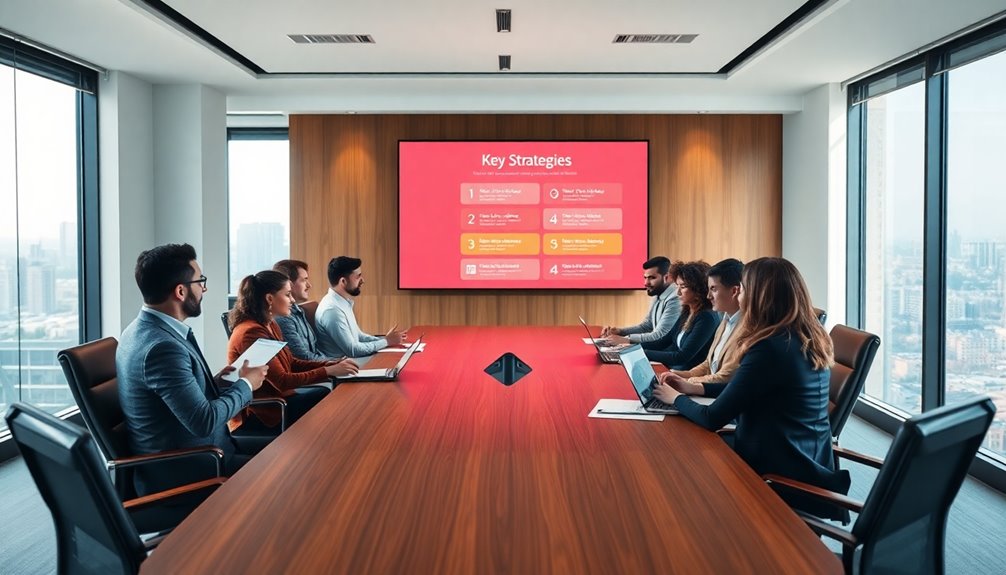To ace your program manager interview in the government and social impact sectors, understanding the company's culture is key. For tip #3, focus on your professional attire; wear well-fitted clothes in neutral colors that project authority and professionalism. Men should opt for tailored suits, while women can choose tailored blouses and dresses. This attention to detail enhances your overall presentation and shows you align with the organization's values. Remember, the right outfit can boost your confidence and make a lasting impression. Stick around to uncover more impactful tips that could transform your interview preparation!
Key Takeaways
- Research the organization's mission and values to tailor your responses and demonstrate alignment with their goals.
- Utilize the STAR method to effectively communicate your past experiences and problem-solving skills.
- Highlight relevant project management frameworks like Agile or PMBOK to showcase your proficiency.
- Prepare insightful questions about the organization to exhibit your interest and commitment to their mission.
- Follow up with a personalized thank-you email to reinforce your enthusiasm and professionalism after the interview.
Introduction to Job Interviews

Job interviews for program manager positions can often feel daunting, but understanding their structure can help you prepare effectively. The interview process typically consists of multiple sessions, each focusing on critical skills like project planning, risk management, and stakeholder engagement. Companies like Google and Meta often conduct 45-minute phone interviews, while Amazon opts for 1-hour video interviews via Chime. This variation across organizations highlights the importance of knowing what to expect.
Your application can begin through direct applications, recruitment outreach, or referrals. Referrals significantly boost your chances of having your application reviewed by a human, which is crucial in the hiring process. After submitting your application, be prepared for a waiting period of 0 to 14 days for a response. If you experience a longer wait, it might indicate a more thorough review process.
Building a solid relationship with recruiters is essential as they're motivated to create a pool of qualified candidates. They want to find the right match for the program manager role, so engaging with them can enhance your chances of success in the interview process.
Preparing for the Interview

To ace your program manager interview, start with thorough research on the organization and a solid self-assessment of your skills. Make sure your resume highlights relevant experiences and aligns with the job description. Additionally, emphasizing your knowledge of testing methodologies can further demonstrate your readiness to handle project management in software development. Furthermore, understanding the importance of AI technologies can showcase your ability to leverage innovative solutions in project execution. Finally, practice interview techniques that showcase your expertise in project management and cultural fit. Additionally, remember that demonstrating a growth mindset can significantly enhance your appeal to interviewers, as it reflects your ability to adapt and overcome challenges in dynamic environments.
Research and Self-Assessment
Before stepping into your program manager interview, diving deep into research and self-assessment is crucial. Start by thoroughly researching the organization's mission, values, and recent projects. This understanding will help you demonstrate how your goals align with theirs, showing your cultural fit during the interview.
Next, conduct a self-assessment of your skills and experiences in program management. Focus on specific examples of successful project delivery, stakeholder engagement, and team development to illustrate your qualifications effectively. Familiarize yourself with key challenges and trends in the government and social impact sectors; this knowledge will enable you to engage in meaningful discussions and showcase your expertise.
Be prepared to articulate your leadership style and how you motivate teams towards achieving strategic goals. Emphasize your adaptability and collaboration in diverse environments. Additionally, review common program management frameworks and methodologies, like Agile or PMBOK, to demonstrate your technical proficiency and strategic thinking capabilities.
Resume and Application Preparation
Crafting a strong resume and application is a key step in showcasing your program management expertise and securing that interview. Start by tailoring your resume to highlight specific skills like stakeholder engagement, risk management, and leadership. This alignment with the job description can set you apart from other candidates. Use quantifiable achievements, such as "managed a portfolio of projects worth $2 million," to provide concrete evidence of your impact and capabilities. Implementing an MVP (Minimum Viable Product) approach can also help you refine your application based on feedback and improve your chances of success. Additionally, consider optimizing your application by ensuring it is free of errors and formatted professionally, which reflects your attention to detail.
In your resume and application preparation, include relevant certifications like PMP or Agile, which demonstrate your commitment to the field and enhance your qualifications for program management roles. It's also essential to reflect multidisciplinary skills in your application, emphasizing experiences in communication, team development, and strategic planning—key attributes for program managers.
Additionally, consider adding a cover letter that narrates your unique experiences, especially if you come from social impact or government sectors. This personal touch can resonate with potential employers and highlight your fit for job opportunities. By following this expert advice, you'll be well on your way to creating a compelling resume and application that stands out in a competitive job market. Understanding the importance of effective communication can further enhance your interactions during the interview process.
Interview Preparation Techniques
Effective interview preparation is crucial for success in securing a program manager position. Start by researching the organization's mission, values, and recent projects. Tailor your responses to demonstrate alignment with their goals, showcasing your understanding of their work. Familiarize yourself with program management frameworks like Agile or Waterfall, and tools such as Jira or Trello that might be used in the role.
Discussing your experience with stakeholder engagement is vital. Prepare to explain how you've navigated complex relationships and aligned diverse perspectives toward a common goal. Be ready to share specific lessons learned from past projects, highlighting your strategic thinking and problem-solving abilities. Use real-life examples to illustrate how you managed risks and overcame challenges.
Finally, review common behavioral interview questions and practice using the STAR (Situation, Task, Action, Result) method to structure your answers. This approach allows you to effectively showcase your competencies and achievements. Don't forget to ask questions during the interview; it shows your engagement and helps you assess if the organization is the right fit for you. With thorough preparation, you'll be positioned to impress as a program manager candidate. Additionally, consider the growing importance of AI jobs in various sectors, as they may intersect with your program management responsibilities.
Dressing for Success

When it comes to dressing for your program manager interview, understanding the company's culture and dress code is key. You'll want to choose business professional attire that's clean, well-fitted, and in neutral colors to make a strong impression. Let's explore some general guidelines, gender-specific tips, and how to approach seasonal and casual attire. Additionally, consider incorporating elements of sustainable grooming practices into your overall look to align with modern values and demonstrate your awareness of current trends.
General Attire Guidelines
Dressing for success is crucial for program managers heading into interviews, especially in the government and social impact sectors. Your attire should be business formal, so consider wearing a tailored suit or a professional dress to convey professionalism and confidence. Stick to neutral colors like navy, gray, or black, as these shades project authority and are more professional than bright or flashy hues.
When it comes to accessories, keep things minimal. A classic watch or simple jewelry can enhance your polished look without drawing attention away from you. Your footwear should be clean and professional; opt for closed-toe shoes that are comfortable enough for confident movement.
Grooming is just as important as what you wear. Ensure your hair is neat, and if you have facial hair, keep it well-trimmed. This attention to detail reflects your respect for the interview setting and shows that you understand the significance of professionalism. By following these general attire guidelines, you'll make a strong first impression that aligns with the expectations of the government and social impact sectors, setting the stage for a successful interview.
Gender-Specific Attire Tips
Understanding the nuances of gender-specific attire can further enhance your professional presentation during program manager interviews. For women, a tailored blazer paired with tailored trousers or a knee-length skirt effectively conveys professionalism and authority. Choose fabrics that fit well and allow for ease of movement; this combination projects confidence and seriousness.
Men, on the other hand, should opt for a well-fitted suit in neutral colors like navy, gray, or black. A crisp dress shirt and a conservative tie are essential to complete the look, as they reinforce your seriousness in the interview setting.
When it comes to accessories, keep them minimal and understated. Women can select simple jewelry, while men should avoid flashy watches or overly casual shoes. Closed-toe shoes are advisable for both genders; women should aim for professional heels that are comfortable, while men should wear polished dress shoes.
Lastly, grooming plays a vital role in your overall appearance. Neat hair, clean nails, and subtle makeup for women, alongside a clean shave and well-groomed look for men, can significantly enhance your professionalism.
Seasonal and Casual Attire
Choosing the right attire for a program manager interview can set the tone for a successful interaction. For positions in government and social impact sectors, dressing in business casual is often preferred. This balance makes you look professional yet approachable. Men should opt for a collared shirt and dress pants, possibly adding a blazer. Women can choose a blouse paired with tailored trousers or a knee-length dress. Additionally, being mindful of tick repellents can help prevent distractions caused by discomfort during outdoor activities if your interview takes place in such an environment.
Make sure to avoid overly casual clothing like jeans, t-shirts, or sneakers, as these can undermine your professional image. Accessories should be minimal and tasteful; a classic watch or simple jewelry can enhance your overall presentation without becoming a distraction.
To refine your choices, research the organization's culture. Job postings might give clues about their dress code. If the organization leans toward casual attire, a smart-casual look could be acceptable, but still steer clear of extremes. Your goal is to convey respect for the interview process while aligning with the organization's values. By dressing appropriately, you're not just making a statement about yourself; you're also showing that you understand the role and its expectations. Additionally, a well-organized wardrobe can reflect mental clarity, which helps you approach your interview with confidence.
Mastering Interview Questions

When it comes to mastering interview questions, you need to be prepared for a range of topics, including common inquiries and behavioral scenarios. Understanding industry-specific questions will help you show your expertise, while advanced techniques can set you apart from other candidates. By practicing your responses, you'll be ready to impress with your strategic thinking and problem-solving skills.
Common Interview Questions
As you prepare for a program manager interview, it's essential to anticipate the common questions you'll face. These questions typically focus on project planning, risk management, and stakeholder engagement. Interviewers want to assess your relevant experience and strategic thinking. To stand out, you should be ready to discuss specific scenarios from your past roles where you've successfully navigated challenges. For instance, I've learned that articulating how you've managed project risks or engaged stakeholders can demonstrate your problem-solving and leadership skills effectively.
You might also encounter questions about team dynamics and motivation strategies. Remember, program managers must lead diverse teams, so showcasing your ability to foster collaboration is key. Additionally, prepare to express your understanding of the organization's mission and how your skills align with their strategic objectives. This not only shows your commitment but also your cultural fit within the organization.
Finally, while you may not dive into behavioral questions just yet, keep in mind that framing your responses using the STAR method can help you organize your thoughts effectively. Being prepared for these common interview questions will give you a strong foundation for your interview.
Behavioral and Situational Questions
Mastering behavioral and situational questions can set you apart in a program manager interview. Behavioral questions often focus on your past experiences, so it's crucial to use the STAR method—Situation, Task, Action, Result—to structure your responses effectively. This approach will help you deliver clear and concise answers that highlight your competencies.
On the other hand, situational questions assess how you might handle hypothetical scenarios. They emphasize your problem-solving and decision-making skills, which are vital in program management. When preparing for these questions, think about examples that showcase your stakeholder engagement, risk management, and team leadership abilities.
To enhance your performance, familiarize yourself with the organization's mission and values. This knowledge allows you to tailor your responses, demonstrating alignment with their goals. Additionally, practicing responses to common behavioral questions, like handling conflict or leading a team through challenging projects, can significantly improve your confidence and clarity during the interview.
Industry-Specific Questions
Preparing for industry-specific questions can give you a significant edge in your program manager interview. Dive into the latest trends and challenges in program management, especially in the government and social impact sectors. Interviewers often focus on policy influence and community engagement, so make sure you understand the unique metrics and success indicators used in social impact projects. Be ready to discuss how you'd measure program effectiveness in addressing social issues.
Your experience with stakeholder engagement will be crucial. Be prepared to explain how you've navigated complex relationships with government entities and non-profit organizations. Demonstrating adaptability in managing diverse teams and projects is also vital, as program managers in this field juggle multiple initiatives with varying objectives and community needs.
Finally, highlight your familiarity with compliance and regulatory frameworks that govern social programs. Interviewers may ask about your approach to ensuring alignment with legal and ethical standards. By preparing thoroughly for these industry-specific questions, you'll not only showcase your expertise but also demonstrate your commitment to impactful program management.
Advanced Question Techniques
To excel in program manager interviews, honing your question-response techniques is crucial. Mastering the STAR method (Situation, Task, Action, Result) allows you to effectively structure your responses, showcasing your problem-solving skills and past successes. Each step of the STAR method helps you articulate your experience clearly, making it easier for hiring managers to grasp your capabilities.
Familiarize yourself with common program management questions, particularly those focusing on project planning and stakeholder engagement. These areas are critical for demonstrating your relevant expertise. Prepare to discuss specific metrics or KPIs from previous projects, as quantifiable results significantly enhance the credibility of your experience.
When faced with case study questions, practice articulating your thought process. This approach allows the interviewer to evaluate your analytical and strategic thinking in real time. Furthermore, anticipate follow-up questions that delve deeper into your initial responses. This preparation shows your ability to think critically and provide comprehensive answers, which hiring managers highly value.
Asking Insightful Questions

Asking insightful questions can set you apart in a program manager interview and show your genuine interest in the role. Focus on strategic questions that align with the organization's goals and values, as well as closing questions that clarify how you can contribute effectively. This approach not only reflects your knowledge but also demonstrates your commitment to collaboration and success.
Strategic Questions to Impress
Strategic questions can set you apart in a program manager interview by demonstrating your depth of understanding and engagement. As you prepare for your new job, think about asking how the organization's strategic goals align with the program manager role. This shows you grasp the broader impact of your position.
Inquire about the key performance indicators (KPIs) used to measure program success. This highlights your focus on results and accountability, which are crucial for effective management. You can also ask about the challenges the team currently faces; this showcases your problem-solving mindset and readiness to tackle real issues head-on.
Additionally, request information on how different departments or stakeholders collaborate. This reveals your understanding of the multifaceted nature of program management and the critical importance of teamwork. Lastly, don't forget to ask about opportunities for professional development and growth within the organization. This signals your commitment to continuous improvement and alignment with the organization's values.
Closing Questions
What closing questions can you ask to leave a lasting impression during a program manager interview? Thoughtful inquiries can demonstrate your genuine interest in the role and the organization. Start by asking about the strategic goals of the organization and how the program manager role contributes to those objectives. This shows you understand their mission and highlights your strategic thinking.
Next, inquire about team dynamics and how the program manager collaborates with other departments. This question emphasizes your focus on cross-functional teamwork, which is essential in program management. You might also ask about the organization's approach to stakeholder engagement and community impact. Such questions signal your commitment to values central to government and social impact roles.
Finally, consider asking about professional development opportunities within the organization. This not only shows your desire for growth but also indicates your commitment to continuous improvement in program management. By asking these insightful questions, you reinforce your alignment with the organization's goals and demonstrate that you're a proactive candidate ready to make an impactful contribution.
Effective Communication and Presentation

When you're preparing for an interview, effective communication and presentation are key to making a strong impression. Focus on crafting clear, concise responses while showcasing your body language and confidence. These elements will help you convey your message more powerfully and connect with your interviewers.
Crafting the Perfect Response
While preparing for a program manager interview, it's crucial to craft responses that are both clear and impactful. Start by using the STAR method, which helps you structure your answers effectively. Describe the Situation, outline the Task, share the Actions you took, and highlight the Results. This approach not only clarifies your experiences but also showcases your achievements.
Tailor your responses to reflect the organization's values and mission. This demonstrates your understanding of their goals and your alignment with their vision. It also enhances your fit for the role.
Practice active listening during the interview. Engaging meaningfully with questions ensures your answers directly address the interviewer's inquiries, making your responses more relevant.
Incorporate specific metrics and data points to quantify your accomplishments. This adds weight to your presentation and connects your experiences to strategic goals.
Finally, illustrate your adaptability and problem-solving skills by sharing relevant examples. This showcases your ability to navigate complex challenges, a vital trait in program management, especially within government and social impact sectors. By crafting thoughtful, structured responses, you'll set yourself apart as a strong candidate.
Body Language and Confidence
Effective body language and confidence play a pivotal role in how you present yourself during a program manager interview. To make a strong impression, adopt open body language—keep your arms uncrossed and maintain a relaxed posture. This not only conveys confidence but also makes you appear approachable to interviewers.
Eye contact is crucial; aim to maintain it about 50-70% of the time. This signals your engagement and sincerity, enhancing effective communication. When you speak, use hand gestures to emphasize key points. Just remember to keep them natural and avoid being overly distracting.
Before the interview, consider practicing power poses, like standing tall with your hands on your hips for two minutes. Research by Amy Cuddy shows this can significantly boost your confidence and reduce stress.
Finally, pay attention to your vocal variety. Change your pitch and pace to keep interviewers engaged, and ensure your tone is clear and confident, reflecting your passion for the role. Mastering these elements of body language and confidence will elevate your interview performance and help you stand out as a strong candidate.
Post-Interview Strategies

After your interview, it's crucial to maintain communication to show your continued interest. Send a personalized thank-you email, and if you haven't heard back in a week, follow up with the recruiter. Handling offers and rejections gracefully can also set you up for future opportunities, so let's explore how to navigate these situations effectively.
Follow-Up Communications
Sending a thank-you email promptly can make a significant difference in your post-interview strategy. Aim to send it within 24 hours of your interview. This simple gesture reinforces your interest in the position and helps you stand out to the hiring team. In your follow-up, reiterate your key qualifications and highlight how they align with the organization's goals, referencing specific points discussed during the interview.
If you haven't received feedback within the typical five business days, it's appropriate to send a polite follow-up email inquiring about the status of your application. This shows initiative and keeps you in the loop. Use this opportunity to address any questions or concerns that came up during the interview, demonstrating your proactive approach to problem-solving.
Maintaining a professional tone is crucial. Expressing gratitude in your follow-up not only strengthens your rapport with the hiring team but also keeps you top of mind for future opportunities. Remember, your follow-up communications are a reflection of your professionalism and commitment, so make them count!
Handling Offers and Rejections
Navigating offers and rejections can feel overwhelming, but handling them with grace is key to your professional growth. When you receive a job offer, take a moment to evaluate the terms and conditions closely. Consider salary, benefits, and work-life balance to ensure the role aligns with your career goals and personal needs before making a decision.
If you face a rejection, don't be discouraged. Politely request feedback from the recruiter. Understanding areas for improvement can enhance your chances in future interviews and show your commitment to growth.
During any waiting period after interviews, use the time wisely. Send a thank-you note, expressing gratitude for the opportunity and reiterating your interest in the role. This simple gesture keeps you on their radar.
Maintain open communication lines with recruiters; a positive relationship can lead to future opportunities or referrals. Remember, hiring processes can be lengthy, so patience is crucial. Understand that delays are common, and managing expectations can help mitigate frustration. By approaching both offers and rejections thoughtfully, you'll position yourself for future success in your career journey.
Remote Interviewing Best Practices

When it comes to remote interviewing, mastering digital techniques is key to making a strong impression. You'll also want to be aware of different cultural communication styles, as they can impact your interactions. Staying updated on emerging interview trends can give you an edge in this evolving landscape.
Digital Interviewing Techniques
As you prepare for a remote interview, creating an inviting and professional atmosphere is crucial to making a strong impression. Ensure your background is tidy and free of distractions, and use good lighting to enhance your visibility. This sets a positive visual tone for the conversation.
Test your technology in advance, checking your internet connection, camera, and microphone. This proactive step can save you from technical issues that disrupt the interview flow. Choose a quiet, dedicated space for the interview to enhance focus. This helps minimize interruptions from pets, family members, or outside noise.
During the interview, practice active listening by nodding and using verbal affirmations. This conveys your engagement and interest, even without physical presence. Be mindful of potential video lag; it's wise to pause briefly after speaking. This allows for seamless conversation flow and prevents you from talking over the interviewer.
Cultural Communication Styles Awareness
Creating a professional atmosphere is just the beginning; understanding cultural communication styles can significantly enhance your remote interview experience. Different cultures approach communication differently—some prioritize directness, while others lean towards indirectness. Recognizing these nuances can help you convey your messages more effectively and avoid potential misunderstandings.
Active listening is vital during remote interviews, especially when cultural differences come into play. Make it a point to ask clarifying questions if something isn't clear. This not only bridges cultural gaps but also demonstrates your commitment to understanding your interviewer's perspective.
Non-verbal cues are another area where cultural awareness is essential. Facial expressions and gestures can vary widely, so being mindful of these differences can enhance rapport and ensure you're interpreting signals correctly.
Adapting your communication style to align with your interviewers' cultural norms shows cultural competence, a key trait for program managers in diverse environments. Finally, use video conferencing tools that enable visual engagement; they help you read cues and establish connections, making your remote interview experience smoother and more productive.
Emerging Interview Trends
The rise of remote interviewing has transformed how candidates prepare and present themselves in job searches. When you're interviewing via platforms like Zoom or Microsoft Teams, ensure your technology is tested and functioning properly. Nothing can derail your chances like a last-minute technical glitch, so have a backup plan ready, like a phone for audio or an extra device.
Dress professionally from head to toe. You never know when an unexpected camera angle might reveal more than you intended. Keeping your appearance sharp boosts your confidence and leaves a positive impression.
Engaging with the interviewer is crucial. Maintain eye contact through the camera lens to create a more personal connection, even from a distance. This simple act can make your interaction feel more genuine.
Lastly, familiarize yourself with the specific tools and software the organization uses. By demonstrating your knowledge of their systems, you highlight your adaptability and preparedness for the role. Embracing these remote interviewing best practices can set you apart and help you ace your next interview.
Confidence and Mindset

Confidence is key when it comes to interviews, and building unshakeable confidence can set you apart from other candidates. By adopting inspirational strategies and maintaining a motivational mindset, you can tackle challenging questions with ease. Remember, a positive outlook not only helps you perform better, but it also showcases your ability to thrive in program management roles.
Building Unshakeable Confidence
Building unshakeable confidence can feel like a daunting task, but it's all about recognizing and leveraging your unique strengths. Start by reflecting on your experiences and skills that make you stand out. When you know what you bring to the table, you'll communicate more effectively during interviews.
Visualization techniques can be a game changer. Spend time mentally rehearsing successful interview scenarios, picturing yourself answering questions confidently and making a great impression. This practice can significantly reduce anxiety and foster a positive mindset.
Engaging in mock interviews with peers or mentors is another powerful way to build confidence. They can provide constructive feedback, helping you refine your presentation and articulate your qualifications more effectively.
Don't forget to research the organization and its values. This knowledge will not only boost your confidence but also allow you to tailor your responses, demonstrating your alignment with their mission.
Finally, adopt a growth mindset. View challenges as opportunities for learning and improvement. This perspective empowers you to approach interviews with resilience and self-assurance, making it easier to present your best self.
Inspirational and Motivational Strategies
Harnessing inspiration and motivation can significantly amplify your confidence and mindset as you prepare for interviews. Cultivating a growth mindset allows you to view challenges as opportunities for learning, enhancing your performance during interviews. When you see setbacks as stepping stones, you'll approach your preparation with a more positive outlook.
Try visualization techniques to mentally rehearse successful interview scenarios. Research shows this can boost your confidence and reduce anxiety by up to 20%. Pair this with a consistent positive self-talk routine; affirming your abilities can lead to improved outcomes in high-pressure situations.
Engaging in mock interviews with peers or mentors provides invaluable feedback, helping you refine your responses and deliver them with confidence during the actual interview. Additionally, set specific, achievable goals for each preparation session. This creates a sense of accomplishment, fostering motivation and focus as you approach interview day.
Practice With a Mock Interview

Practicing with a mock interview is a crucial step in your preparation. By simulating the interview environment, you can refine your responses to key program manager topics and get comfortable with your delivery. Remember to consider essential items and final preparation steps to ensure you're ready to impress.
Essential Items and Preparation
A successful mock interview can significantly boost your confidence and readiness for a program manager position. Start by conducting a mock interview with a friend or mentor who has experience in program management. This will help simulate the interview environment and allow you to practice answering role-specific questions.
Before the mock interview, prepare answers to common program manager questions, focusing on your experience in project planning, risk management, and stakeholder engagement. Utilize the STAR method (Situation, Task, Action, Result) to structure your responses. This technique ensures you clearly demonstrate your problem-solving and leadership skills.
During the mock interview, pay attention to your clarity of communication and how well your responses align with the organization's values and goals. Afterward, seek constructive feedback from your mock interviewer. This input is invaluable for identifying areas for improvement.
Additionally, familiarize yourself with the interview structure of the specific company you're applying to. This knowledge allows you to tailor your preparation and practice effectively, ensuring you're aligned with what the organization seeks in a program manager. Remember, practice makes perfect, so take this opportunity seriously!
Final Preparation Steps
Confidence is key when heading into a program manager interview, and practicing with a mock interview can help you build that essential self-assurance. Find a peer or mentor experienced in program management to conduct this mock session. This simulation will mimic the actual interview environment and provide you with constructive feedback.
As you prepare, focus on commonly asked program management questions, such as those related to project planning, risk management, and stakeholder engagement. This practice will enhance your fluency and confidence in responding. Recording your mock interviews is crucial; it allows you to review your body language, tone, and clarity, helping you identify areas for improvement.
Utilize the STAR method (Situation, Task, Action, Result) to structure your answers effectively. This approach will demonstrate your problem-solving and leadership skills clearly. Remember to incorporate real-life examples that align with the role's requirements, showcasing your relevant skills and adaptability.
Interview Structure and Flow

When preparing for a program manager interview, you'll encounter a structured process designed to evaluate your expertise in key areas like project planning and risk management. Typically, these interviews consist of five sessions that focus on role-related knowledge, assessing your ability to handle complex projects and manage teams effectively.
Different companies have varying formats; for instance, Google and Meta conduct 45-minute phone interviews, while Apple opts for shorter 30-minute calls. Amazon, on the other hand, uses 1-hour video interviews via Chime. Each of these formats can influence the types of questions you'll face, so it's crucial to adapt your preparation strategy accordingly.
Expect questions around leadership, cultural fit, and general cognitive abilities (GCA). These aspects are vital as they help interviewers gauge your overall suitability for the program manager role within their organization. Additionally, understanding the distinctions between program management, technical program management, and product management is essential, as each might carry different expectations and focus areas during the interview. By familiarizing yourself with these structures, you'll be better equipped to navigate the interview flow successfully.
Summarize Essential Interview Techniques

Understanding the interview structure is just the beginning; mastering effective interview techniques can significantly boost your chances of success. Start by familiarizing yourself with the specific interview format used by the company. For instance, Google and Meta hold 45-minute phone interviews, while Amazon opts for 1-hour video interviews on Chime. Knowing the format helps you prepare accordingly.
Next, focus on demonstrating your expertise in key areas like project planning, risk management, and stakeholder engagement. Program manager interviews usually consist of five sessions assessing these competencies, so be ready to showcase your skills in these domains.
Networking is crucial, too. Leverage referrals to enhance your application's visibility; connecting with current employees can improve the chances of your resume being reviewed by a person rather than getting lost in automated filters.
During the waiting period after applying, be patient. Response times can vary from 0 to 14 days, and longer delays often indicate a more thorough review process. Finally, during the recruiter screen, maintain open communication. Clarify your experiences to avoid red flags and ensure your skills, interests, and compensation expectations align with the role.
Encouragement and Final Thoughts

As you gear up for your program manager interview, keep in mind that your adaptability and diverse skills can really set you apart. Program management roles demand the ability to juggle multiple responsibilities and adjust to shifting priorities in dynamic environments. Emphasize your experience with stakeholder engagement, showcasing how it aligns with community needs and values. This not only highlights your commitment to social impact but also demonstrates your ability to connect with diverse groups.
Don't forget to showcase your multidisciplinary skills in communication and team development. Employers want to see how you can motivate teams toward challenging goals. Use personal experiences or unique perspectives to illustrate your problem-solving approach and how it can lead to effective program outcomes.
Lastly, leverage your network. Reaching out to current employees and seeking referrals can significantly enhance your chances. Personal connections often lead to more thorough reviews of your qualifications, giving you an edge in the competitive landscape. Remember, you've got the skills and the passion—now it's time to let them shine. You're on the path to making a meaningful impact, so go in with confidence!
Frequently Asked Questions
How to Ace a Government Job Interview?
To ace a government job interview, you need to understand the agency's mission and values. Use the STAR method to prepare for behavioral questions, showcasing your relevant experiences. Familiarize yourself with policies and current issues to demonstrate your readiness. Highlight your skills in stakeholder engagement and collaboration, as these are essential. Finally, be ready to discuss how you can contribute to equity, diversity, and inclusion initiatives within the agency.
Can You Think of 3 Key Tips for a Successful Interview?
For a successful interview, focus on three key tips. First, understand the distinctions between program management roles to articulate your fit. Next, prepare for behavioral questions by reflecting on your relevant experiences in project planning and stakeholder engagement. Lastly, leverage your network; seek referrals to increase your chances. Engaging with recruiters and showing genuine interest can also make a positive impact. You've got this! Stay confident and be yourself.
How to Crack a Program Manager Interview?
To crack a program manager interview, start by understanding the differences in management roles. Prepare for structured interviews focusing on project planning and risk management. Anticipate both cognitive ability questions and behavioral inquiries to showcase your leadership qualities. Networking for referrals can boost your chances, so reach out to connections. Finally, be patient after the interview; feedback usually takes about five business days, so don't rush for updates.
What Are the Five C's to Remember in an Interview?
In an interview, remember the five C’s: Clarity, Confidence, Connection, Competence, and Commitment. Clearly articulate your experiences relevant to the role, showcasing your achievements. Approach the discussion with confidence, reflecting your belief in your qualifications. Establish a connection by understanding the organization’s mission, and demonstrate your skills in communication and leadership. Finally, convey your commitment to their objectives, highlighting your long-term interest in making an impact. When preparing for a senior people program manager interview, it’s essential to display a high level of competency in areas such as strategic planning, team management, and organizational development. In addition, showcasing your commitment to driving positive change within the company and aligning with their values will set you apart from other candidates. Remember these senior people program manager interview tips to ensure you come across as a strong candidate who is both capable and dedicated to making a meaningful impact within the organization.
Augustus is the visionary leader and Editor-in-Chief of Personality-Test.net. With an unwavering commitment to quality and authenticity, he oversees all content, ensuring it enlightens and empowers our audience. Augustus believes deeply in the transformative power of self-awareness and is dedicated to making Personality-Test.net a beacon for those on a journey to understand themselves better.










